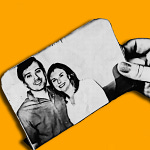When life hands you, well, whatever bizarre, mouth-puckering fruit I got handed, you make some kind of tasty juice out of it. That was the mantra I mentally repeated to myself as I stood across the street from my apartment on a drizzly fall day in 2020 and tried not to topple over in 4-inch-plus heels.
A photographer for Elle was taking pictures of me. I was wearing a flower-splashed deep burgundy dress by The Vampire’s Wife, one of several picked out for me by a stylist at the magazine and loaned to me for the shoot. The gown flattered me, blazing vibrantly against the cool tones of my pale skin.
We were in Harlem’s Marcus Garvey Park, and a child walking near us stopped and gaped in wonder. “She looks like a princess,” he told the woman he was with, and she agreed with him.
Suppressing a laugh, I thought: “If only they knew what I was doing here.” The photos would illustrate an article about me being the girlfriend of the one-time “most hated man in America,” “Pharma Bro” Martin Shkreli. But then I grinned at the compliment. “Why not be a princess for a day,” I mused. ”I’ve been through enough hell up to this point. I might as well enjoy the moment.”
I had spent several months wracked with indecision before finally telling journalist Stephanie Clifford – who had reached out to me in early 2020 – that I would cooperate with a piece she wanted to write about my relationship with Martin. “Martin will not talk to you,” I advised her in an October 2020 email, as I gave her the OK. “Martin might have second thoughts about talking to ME afterward (but I think it's worth the risk).”
Then I leaned over my computer keyboard and wept. Nothing worth doing was ever easy, I reminded myself.
For many reasons already explained, I desperately wanted to come clean about my secret relationship. Stephanie was the ideal journalist to break the news. We had worked together as legal reporters in Brooklyn federal court – me for Bloomberg and her for the New York Times – while the criminal securities fraud case against Martin was unfolding in 2016. She had observed firsthand, with rapt but nonjudgmental curiosity, as my rapport with the young corporate scoundrel started to blossom.
While I wouldn’t say we were “friends” exactly, Stephanie and I got along well. Our desks in the press room were next to each other, and we talked often about the craft of writing. I admired her work and I found her to be extraordinarily intelligent and thoughtful. Her coverage of Martin was fair and multi-dimensional compared with what other journalists wrote, in my view, anyway.
She occupied a rung several levels above me (at least) in the publishing stratosphere. Her resume ticked a load of impressive boxes. She had graduated magna cum laude from Harvard; at the Times, she had won a prestigious Gerald Loeb award. Her first novel, a satirical comedy about a young woman trying to fake her way into blue-blooded society, landed her a seven-figure advance and film rights deal (years before Anna Delvey entered the zeitgeist). In a book jacket blurb, Malcolm Gladwell called it “a superb debut.”











